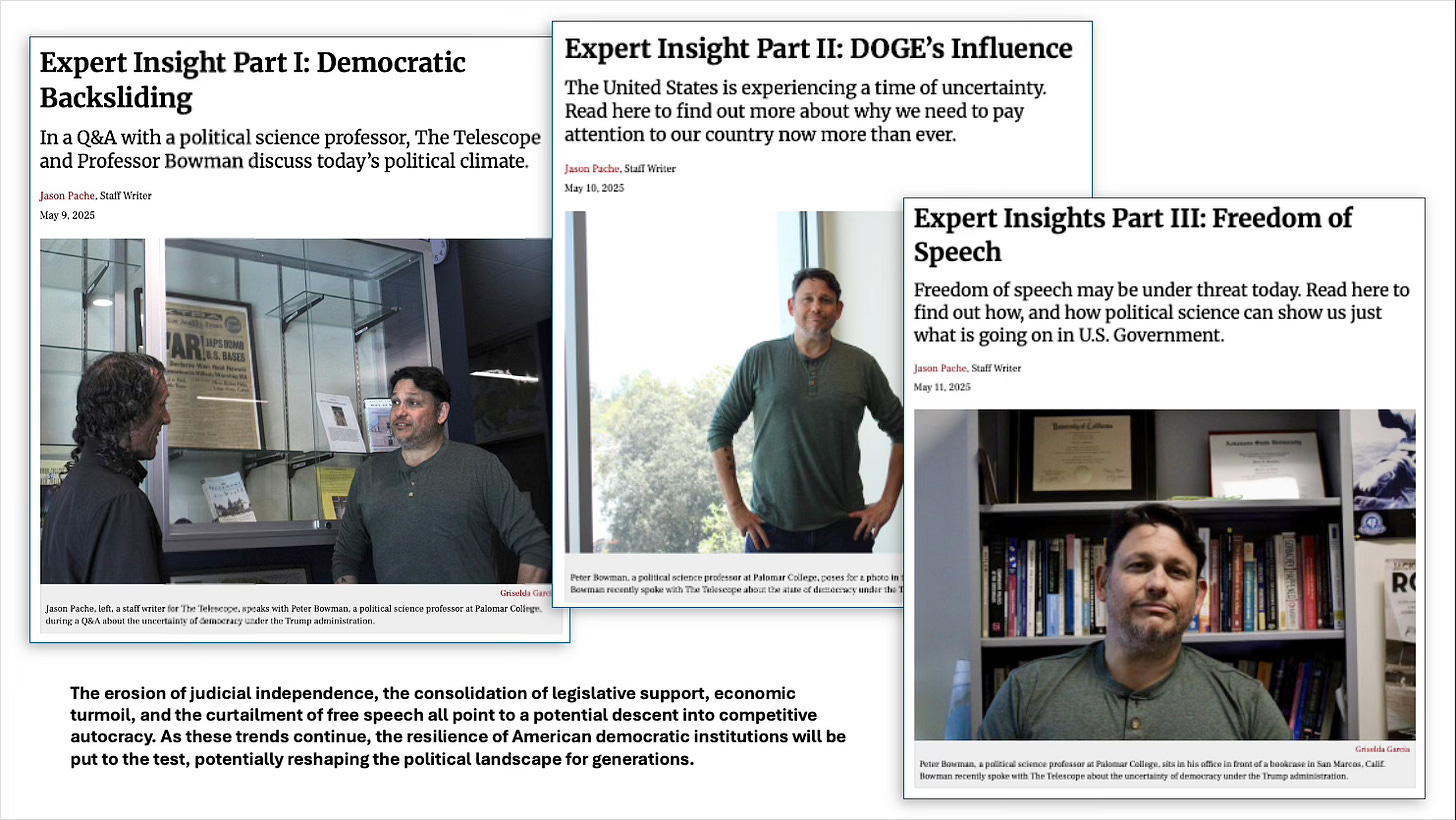- Pascal's Chatbot Q&As
- Posts
- The U.S. is moving toward a form of “competitive autocracy” where democratic institutions are systematically undermined, while still maintaining the facade of free elections and political opposition.
The U.S. is moving toward a form of “competitive autocracy” where democratic institutions are systematically undermined, while still maintaining the facade of free elections and political opposition.
Bowman raises the alarming possibility that local election officials in key battleground states might refuse to certify Democratic victories, effectively nullifying the electoral process.
Essay on the State of American Democracy and Institutional Erosion
by ChatGPT-4o
The Telescope’s Expert Insight series presents a stark assessment of the current state of American democracy, detailing how democratic norms and institutions are being challenged under the Trump administration. These insights, primarily drawn from interviews with political science professor Peter Bowman, paint a picture of a nation at risk of backsliding into autocracy, with significant implications for freedom of speech, economic stability, and the broader constitutional order.
1. Democratic Backsliding: From Liberal Democracy to Competitive Autocracy
In Part I: Democratic Backsliding (May 9, 2025), Bowman argues that the United States is moving toward a form of “competitive autocracy” where democratic institutions are systematically undermined, while still maintaining the facade of free elections and political opposition. This process often involves:
Stacking the Judiciary: Despite the independence traditionally associated with the judiciary, Bowman warns that the Supreme Court's composition, with three justices appointed by Trump, and a conservative majority, risks becoming a compliant body that could validate controversial executive actions, such as ending birthright citizenship, in violation of the 14th Amendment.
Stacking the Legislature: The Republican-controlled Congress, influenced by fear of political retribution or physical threats from Trump’s base, has largely become a compliant body, according to Bowman. This shift effectively eliminates meaningful checks on executive power.
Media Coercion and Chilling Effects: Bowman highlights a chilling effect on media organizations, where the threat of investigations and economic retaliation pressures companies into self-censorship. This preemptive compliance undermines free speech and weakens the media’s role as a democratic watchdog.
Erosion of Free and Fair Elections: Bowman raises the alarming possibility that local election officials in key battleground states might refuse to certify Democratic victories, effectively nullifying the electoral process even without overt voter suppression.
2. DOGE’s Influence: Economic and Institutional Upheaval
Part II: DOGE’s Influence (May 10, 2025) shifts focus to the Department of Government Efficiency (DOGE), led by Elon Musk, which is described as a central player in Trump’s effort to consolidate executive power. Key concerns include:
Economic Consequences of Protectionism: Bowman points out that Trump’s across-the-board 25% tariffs on goods from Canada, Mexico, and China risk triggering stagflation, disproportionately harming low- and middle-income families. This economic uncertainty, combined with potential Social Security cutbacks, could significantly destabilize the U.S. economy.
Unprecedented Executive Control: DOGE’s moves, including offering federal workers buyouts and threatening mass layoffs, reflect an aggressive interpretation of the “unitary actor model” of executive power, which posits that the president has nearly unlimited control over the executive branch. This approach challenges long-standing norms of congressional oversight and separation of powers.
Conflict of Interest and Opaqueness: Musk’s dual role as head of DOGE and a major private sector entrepreneur raises significant conflict of interest concerns, particularly if regulatory agencies overseeing his companies are weakened or dismantled. This dynamic is further complicated by the opaque decision-making processes within DOGE, making accountability nearly impossible.
3. Threats to Free Speech and Academic Freedom
In Part III: Freedom of Speech (May 11, 2025), Bowman discusses the growing threats to free speech under the Trump administration, focusing particularly on academia:
Executive Overreach in Education: Executive orders targeting DEI (Diversity, Equity, and Inclusion) programs, coupled with threats to withdraw federal funding from universities, undermine academic freedom and state autonomy in education policy. This is a direct challenge to both the First Amendment and long-standing principles of federalism.
Chilling Effect on Political Dissent: Bowman argues that Trump’s executive orders effectively criminalize certain forms of political protest, such as pro-Palestinian or pro-immigration demonstrations, by threatening deportation for international students and disciplinary action for American students. This echoes tactics used by authoritarian regimes to stifle dissent and consolidate control.
Media Self-Censorship: Bowman highlights recent examples of preemptive compliance by media outlets, such as the last-minute retraction of political endorsements by major newspapers, as a troubling sign of press self-censorship in the face of executive pressure.
Conclusion: A Constitutional Crossroads
The Telescope series presents a troubling picture of American democracy at a critical juncture. Bowman’s analysis reveals that democratic backsliding is not merely a hypothetical risk but an ongoing process with far-reaching consequences. The erosion of judicial independence, the consolidation of legislative support, economic turmoil, and the curtailment of free speech all point to a potential descent into competitive autocracy. As these trends continue, the resilience of American democratic institutions will be put to the test, potentially reshaping the political landscape for generations.
References
Expert Insight Part I: Democratic Backsliding – The Telescope, May 9, 2025. Available at: Democratic Backsliding.
Expert Insight Part II: DOGE’s Influence – The Telescope, May 10, 2025. Available at: DOGE’s Influence.
Expert Insight Part III: Freedom of Speech – The Telescope, May 11, 2025. Available at: Freedom of Speech.
